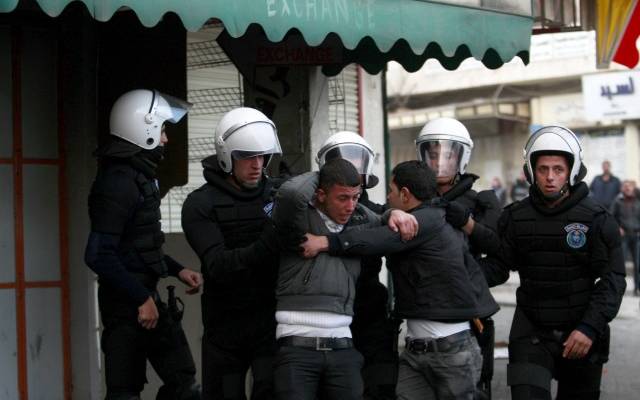Amnesty International denounced the Palestinian leadership for taking further steps to quash dissent by choking freedom of expression and the press.
Amnesty International issued a harsh report on Wednesday criticizing both the Palestinian Authority (PA) and Hamas in Gaza for their suppression of freedom of expression through draconian laws and arrests.
The report states that the PA and the Hamas administration in Gaza “have both tightened the noose on freedom of expression in recent months, launching a repressive clampdown on dissent that has seen journalists from opposition media outlets interrogated and detained in a bid to exert pressure on their political opponents.”
The report points to six journalists arrested by the PA in August so far, 29 websites that were shut down, and the introduction of a controversial Electronic Crimes Law that imposes “tight controls on media freedom” and bans “online expression and dissent.”
In the Gaza Strip, Hamas security forces have arrested at least two journalists since June and hampered others from freely carrying out their work, the report charges. At least 12 Palestinians, including activists, were detained by Hamas for critical comments posted on Facebook.
‘A Chilling Setback’
Magdalena Mughrabi, deputy Middle East and North Africa director at Amnesty International, called the “sharp escalation in attacks” on the Palestinians’ freedom of expression “a chilling setback.”
“By rounding up journalists and shutting down opposition websites the Palestinian authorities appear to be using police state tactics to silence critical media and arbitrarily block people’s access to information,” Mughrabi stated.
The report further charges that the Electronic Crimes Law “violates citizens’ rights to privacy and freedom of expression.” The new decree stipulates prison terms ranging from one year to life for those who use digital means for a range of all-encompassing offenses that allegedly would endanger the safety of the state or the public order as well as harming national unity or social peace. The law could also be used to target anyone for simply sharing or retweeting such news.
Ammar Dweik, head of the government-appointed Palestinian Independent Commission for Human Rights, said the new law is “one of the worst” since the Palestinian autonomy government was established in 1994.
“Instead of presiding over a chilling campaign designed to silence dissent, intimidate journalists and breach the privacy of individuals, the Palestinian authorities must stop arbitrarily detaining journalists and drop charges against anyone prosecuted for freely expressing themselves. They must also urgently repeal the Electronic Crimes Law,” Mughrabi demanded.
At least six people have been detained by the PA and charged with defamation or spreading information that “threatens the state” since the Electronic Crimes Law came into force in July. They are currently awaiting trial. At least 10 journalists were summoned for interrogation by Palestinian security forces in June and July.
Hamas’ Use of Torture
In the Gaza Strip, Hamas security forces arrested two journalists in June, blocked journalists from reporting in some areas and restricted the work of a foreign journalist, according to the report. At least 12 activists and journalists were detained and questioned over comments and caricatures posted on social media that were deemed critical of Hamas authorities.
Amnesty International also gathered evidence suggesting at least one of the activists was tortured in Hamas’ custody by being beaten, blindfolded and forced into stress positions for prolonged periods.
“Hamas must immediately release anyone held solely for peacefully exercising their right to freedom of expression and urgently investigate allegations of torture and other ill-treatment of detainees by security forces,” said Mughrabi.
The Amnesty report numbers 81 attacks on media freedom by the PA since the start of the year. Hamas has been responsible for 20 such attacks.
Rights groups have repeatedly accused PA head Mahmoud Abbas and Hamas of restricting freedoms and engaging in human rights violations, such as arbitrary arrests of political opponents, mistreatment in detention and cracking down on peaceful protests.
Shahwan Jabareen, director of the rights group al-Haq, expressed concern about what he said is a continued slide toward authoritarianism.
“The Palestinian security services intervene in everything,” he said. They have “become the masters of the land.”
By: United with Israel Staff
